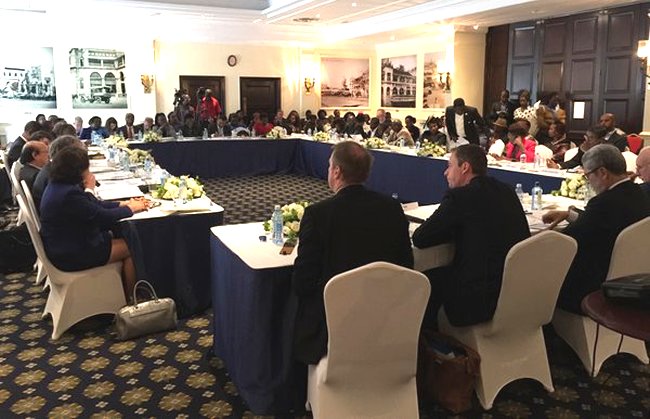Balancing the different effects of NTMs is a core challenge for trade policy makers and was discussed at an event jointly organized by UNCTAD and the Government of Kenya in Nairobi on 16 December 2015.
The Vice-Ministers of Trade from Guatemala and Uruguay; Directors for Trade from Laos, Malaysia and Singapore; and private sector representatives discussed the importance of non-tariff measures (NTMs) for Regional Integration. The Deputy Secretary-General of UNCTAD, Joakim Reiter opened the session with a keynote address.
The discussion focused around three major questions.
The first question related to whether non-tariff measures need to be addressed to achieve deep regional integration.
The importance of NTMs for market access was emphasized by all panelists. As tariffs have been reduced significantly, attention is now moving more and more to NTMs and non-tariff barriers. "We export food for 40 million people and we would like to export food for 50 million. [..] Our exporters pay millions and millions of dollars to meet regulations that are often legitimate but sometimes not", stated the Head of Delegation and Vice Minister, Ministry of Foreign Relations of Uruguay.
Mr. Reiter confirmed in his key note address: "Recent UNCTAD evidence shows that the trade restrictiveness coming from NTMs is more than double that from tariffs".
Ms María Luisa Flores, Vice Minister for Integration and Foreign Trade, Ministry of Economy, Guatemala, emphasized the importance of market access for small and vulnerable countries.
Several speakers mentioned the particularly important role of NTMs for regional integration. Ms Hiswani Harun, Deputy Secretary-General, Ministry of International Trade and Industry of Malaysia, stated: "NTMs are the single most important agenda in ASEAN", and Ms Flores reported about Guatemala's experience regarding NTMs in regional trade agreements in Central and North America. They were joined by other speakers who highlighted the importance of harmonizing regulations and international standards.
Another area that was identified as a tool to address NTMs was transparency. "We need transparency on NTMs and we urge UNCTAD to continue to enhance the availability of information", said Ms Phyllis Wakiaga, CEO Kenya Association of Manufactures.
Ms Akinyi Gikonyo from the private sector in Kenya, made a link between regional integration and whether or not NTMs are all bad, concluding: "Regulations are not bad but they should be harmonized especially in a regional context".
strengthen Regional Integration and Sustainable Growth?
The second question was on the role NTMs play in achieving the SDGs.
One of the key points made by Mr. Reiter was that not all NTMs are bad but they are important to protect humans and animals' health and the environment.
Mr Peter Govindasamy, Director of the International Trade Cluster of Singapore’s Ministry of Trade and Industry, who came from the COP21, stressed the importance of NTMs to achieve the environmental goals set in Paris by saying: " ... they {NTMs} should not be implemented in a way where the burden is shifted from richer to poorer and weaker states".Several speakers underlined the essential and, within the UN system, unique role that UNCTAD has in linking trade, NTMs and SDGs This led Mr. Govindasamy to say that "UNCTAD should play an important role and educate environmental regulators on NTMs".
Other speakers also highlighted the link between NTMs and other SDGs, including on poverty reduction; food security and responsible consumption and production. Highlighting one of the links, Mr. Laohoua Cheuching, Director General, Department of Foreign Trade Policy, Ministry of Industry and Commerce of the Lao PDR, stated that we should work towards "free flows of goods and food while ensuring safety of consumption".
Finally, the question was asked how the multilateral trading system relates to NTMs
All speakers underlined the importance of addressing NTMs at the multilateral level so as not to negate the success that has been made, including in the WTO, on reducing tariffs. They agreed that there should be no discrimination with respect to NTMs, in particular SPS measures and TBT, and that regulatory coherence and convergence at the global level is of utmost importantance.
Several country representatives thanked UNCTAD for their support on NTMs at the regional and global level.


